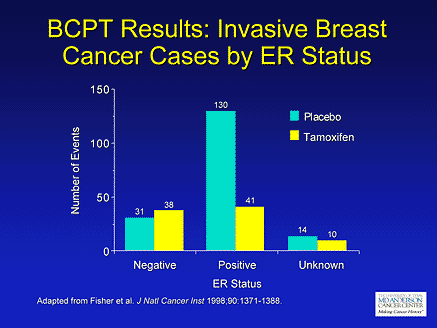For example, our group has been in contact with a woman who is at risk for breast cancer. She is a premenopausal 46 year old woman. She leads a healthy lifestyle: low stress, low fat diet, little alcohol, and she does yoga. She has two half sisters, one from her mother and one from her father. Both have breast cancer. She also has some relatives including her grandmother on her father's side who had breast cancer later in life. She gets more frequent breast exams because of her family history and the fact that she has fibrocystic disease. She has also never had children. It is unlikely that she has the BRCA mutations.
Because of her family history increases her risk of breast cancer three fold[1], her doctor suggested Tamoxifen a few years ago. She was reluctant to take a prescription drug for five years. Because the side effects seemed like she would go into menopause early, Tamoxifen did not seem like the right choice for her since she is premenopausal. She feels that taking Tamoxifen would cause hormonal changes that would be unnatural, such as starting menopause early. The closer she gets to menopause the more she is reconsidering, but questions lingers in her mind:
Does Tamoxifen cause menopause early?
Is Tamoxifen effective in premenopausal women?
In our research so far we have found that
 Tamoxifen technically does not actually cause an early menopause in women, but it does cause menopause-like symptoms[2]. This was found in the Breast Cancer Prevention Trial done by the National Surgical Adjuvant Breast and Bowel Project P-1 Study in 1998. This study confirmed that Tamoxifen can be used as a chemopreventative drug. The study included both pre- and postmenopausal at risk women. No negative heath effects were found in the premenopausal women in the BCPT. Tamoxifen was approved for use in both pre- and postmenopausal women by the FDA[3].
Tamoxifen technically does not actually cause an early menopause in women, but it does cause menopause-like symptoms[2]. This was found in the Breast Cancer Prevention Trial done by the National Surgical Adjuvant Breast and Bowel Project P-1 Study in 1998. This study confirmed that Tamoxifen can be used as a chemopreventative drug. The study included both pre- and postmenopausal at risk women. No negative heath effects were found in the premenopausal women in the BCPT. Tamoxifen was approved for use in both pre- and postmenopausal women by the FDA[3].So how does one advise a patient like the woman we are in contact with? No current research has been done on the effectiveness of Tamoxifen in premenopausal women, so there is no conclusive data as to whether or not it is safe for her to take. She has also heard that if Tamoxifen is taken as prevention it won't be as effective if she needs to take it if she actually gets breast cancer.
What would you do in her shoes? Take a chance on Tamoxifen? Or continue waiting with a healthy lifestyle until you reach menopause or find a malignant tumor?
If you were a physician, how would you counsel a patient like this? Would you handle her case differently if she were postmenopausal? Would you have a different opinion if she had the BRCA mutations?
[1] http://www.cancer.org/Cancer/BreastCancer/DetailedGuide/breast-cancer-risk-factors
[2]http://www.cancer.gov/cancertopics/factsheet/Therapy/tamoxifen
[3]http://www.cancer.org/Cancer/BreastCancer/DetailedGuide/breast-cancer-prevention
Chart is adapted from the BCPT publication and can be found at http://www.medscape.org/viewarticle/450047
